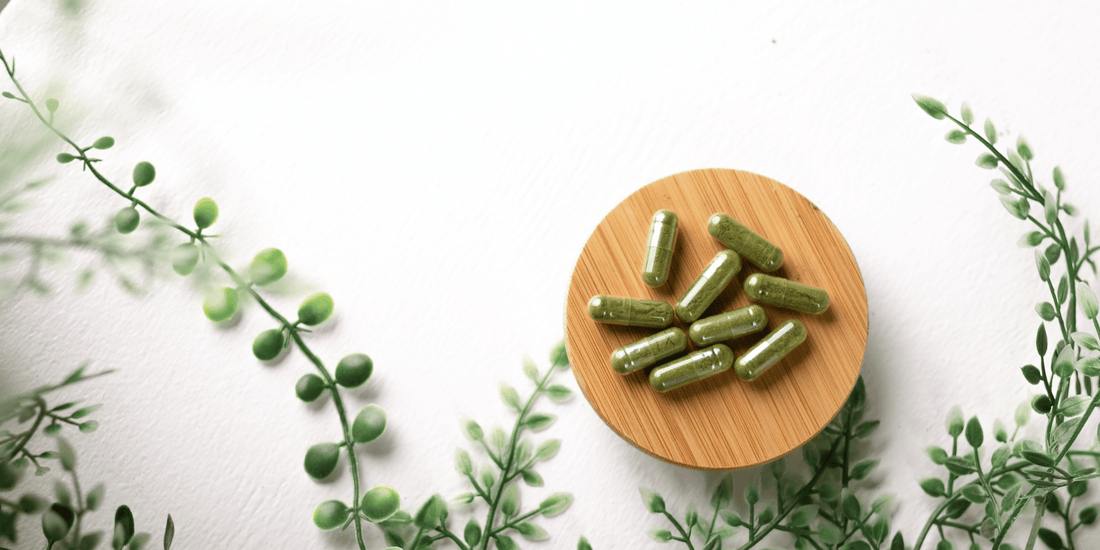
Adaptogens: What Are They And Should You Actually Care?
What actually is an adaptogen?
Adaptogens are plant compounds (usually herbs or mushrooms) that are said to help your body adapt to stress - physical, emotional, or environmental. They are not essential nutrients - they’re functional, not foundational.
The theory: they support balance in the body’s HPA axis (hypothalamic-pituitary-adrenal), which regulates your stress response. Think of them as stress moderators - neither sedatives nor stimulants, but “normalisers.”
The concept has roots in Ayurveda and Traditional Chinese Medicine, but the term “adaptogen” came from Soviet scientists in the 1940s who were looking for performance-enhancing herbs for soldiers and athletes.
The Most Common Adaptogens
|
Adaptogen |
What it’s known for |
|
Ashwagandha |
Calming, cortisol-reducing, often used for anxiety & sleep |
|
Rhodiola |
Mood-lifting, energising, may support mental endurance |
|
Reishi |
Immune-supportive, often used for calm & longevity |
|
Lion’s Mane |
Cognitive support, brain health, focus |
|
Holy Basil (Tulsi) |
Mood, immunity, overall balance |
|
Cordyceps |
Physical stamina, energy, oxygen use |
Do they actually work?
Here’s where it gets murky.
Some adaptogens have early clinical studies or small trials showing benefit (especially ashwagandha and Rhodiola). But:
- Most studies are small, short-term, or animal-based
- Doses in products vary wildly
- Effects can be subtle and slow - not “take one and feel amazing tomorrow”
The strongest evidence is for:
- Ashwagandha (for reducing cortisol + anxiety)
- Rhodiola (for mental fatigue and mood)
- Lion’s Mane (for possible cognitive support — early but promising)
That said, these are not replacements for therapy, rest, or proper nutrition. Think of them as mild allies, not miracle cures.
What to watch out for
- Not all adaptogens are calming → some (like Rhodiola or cordyceps) are stimulating and could worsen anxiety if taken at the wrong time
- Quality matters → cheap powders = low potency or fillers. Look for standardised extracts and third-party testing
- Interactions → herbs are not “nothing.” Check for medication conflicts (especially thyroid, antidepressants, blood pressure meds)
When You Shouldn’t Take Certain Adaptogens
While adaptogens can be useful for some, they’re not right for everyone — and can actually worsen certain conditions or interact with medications.
Here’s what to know before you jump in:
Ashwagandha - updated article Why Ashwagandha and Other “Natural” Supplements Are Facing Global Bans – Yvidét
- Great for: calming the nervous system, reducing cortisol, aiding sleep
- Avoid if you:
- Have a thyroid condition — especially hyperthyroidism. Ashwagandha can increase thyroid hormone production (T3 & T4), which may be risky if you’re already overactive
- Take thyroid medication (e.g., levothyroxine) — it can amplify the effect
- Are prone to autoimmune conditions (like Hashimoto’s or lupus) — it's an immune stimulator
- Have low blood pressure — it can cause further drops
- Also not ideal if: You’re already taking sedatives, benzodiazepines, or SSRIs — as it may exaggerate the calming effect
Best for: wired-but-tired people under chronic stress, with healthy thyroid function
Skip if: you’re on thyroid meds or have an autoimmune or low blood pressure concern
Rhodiola Rosea
- Great for: lifting energy and mood, especially during burnout
- Avoid if you:
- Have bipolar disorder - it may trigger manic symptoms
- Experience anxiety or racing thoughts - Rhodiola can be stimulating, and some people find it makes them feel “on edge”
- Take stimulants (e.g., ADHD meds or caffeine-heavy preworkouts) - it can overdo the effect
- Have low blood pressure - it can drop it further, especially if combined with other adaptogens
Best for: fatigue, brain fog, or mild low mood
Skip if: you have anxiety, bipolar tendencies, or take stimulant medications
Reishi Mushroom
- Great for: immune support, rest, longevity
- Avoid if you:
- Are on immunosuppressants (e.g., post-transplant, autoimmune meds) - Reishi may stimulate the immune system
- Have low blood pressure or are on blood pressure meds - Reishi may lower it more
- Are taking blood thinners (e.g., warfarin) - Reishi may increase bleeding risk
- Also worth noting: High doses can cause digestive upset in some people
Best for: gentle calm, immune balance, rest support
Skip if: you’re on immune-modulating or blood-thinning medications
Lion’s Mane Mushroom
- Great for: cognitive clarity, neuroplasticity, memory support
- Avoid if you:
- Have a history of allergies to mushrooms - even medicinal mushrooms can trigger reactions
- Are on immune therapy or immunosuppressants - like Reishi, it may stimulate immune activity
- Experience nerve sensitivity or tingling - very rare, but anecdotal reports suggest Lion’s Mane may worsen some nerve-related symptoms in sensitive individuals
Best for: brain fog, concentration, mental sharpness
Skip if: you’re mushroom-sensitive, immunosuppressed, or highly reactive to supplements
Holy Basil (Tulsi)
- Great for: mood regulation, gentle energy lift, immune support
- Avoid if you:
- Are trying to conceive or are pregnant - Tulsi has been shown in some animal studies to affect fertility and should be avoided in pregnancy
- Have low blood sugar - Tulsi can reduce blood glucose and may amplify the effect of diabetic medication
- Take anticoagulants - like Reishi, there may be a mild blood-thinning effect
Best for: low-level stress support, immune balance, a natural mood lift
Skip if: you’re TTC, pregnant, hypoglycemic, or taking blood sugar/blood thinning meds
So, should you care?
Only if:
- You're already covering the basics (sleep, food, water, movement) and want an extra layer of support
- You're curious and open to experimenting with mild natural support for stress or energy
- You're willing to give it 2–4 weeks and track how you feel
You probably shouldn’t care if:
- You're hoping for quick-fix stress relief or magic energy boosts
- You're already feeling overwhelmed with supplements
- You're buying based on influencer hype without knowing what's inside
TL;DR: If you’re going to try adaptogens, start here
-
Ashwagandha
Best for: stress, cortisol, sleep
Try it if: you're wired-but-tired, overwhelmed, or not sleeping well
Look for: KSM-66 or Sensoril extract (standardised and studied) -
Rhodiola
Best for: low mood, burnout, mental fatigue
Try it if: you're feeling flat and foggy, especially mid-morning
Avoid if: you have anxiety - it can feel “too energising” for some -
Lion’s Mane
Best for: focus, mental clarity
Try it if: you want something to support brain fog or sharpen up your mornings
Bonus: can stack well with coffee
Yvidet Edit
Adaptogens aren’t magic. But they’re not nonsense either.
Adaptogens aren’t harmless just because they’re “natural.” They can absolutely be supportive tools, but they’re bioactive substances that interact with your body, your brain, and possibly your prescriptions.
If you’re in a good place, doing the work, and looking for an extra edge to manage stress or feel sharper - a quality adaptogen might be worth exploring.
Before you take any adaptogen regularly:
- Check your current medications and medical history
- Start one at a time, at a low dose
- Track how you feel after 1–2 weeks
- Don’t mix multiple adaptogens unless you know how each one affects you
